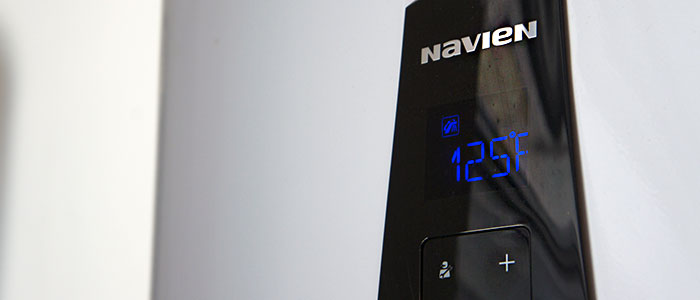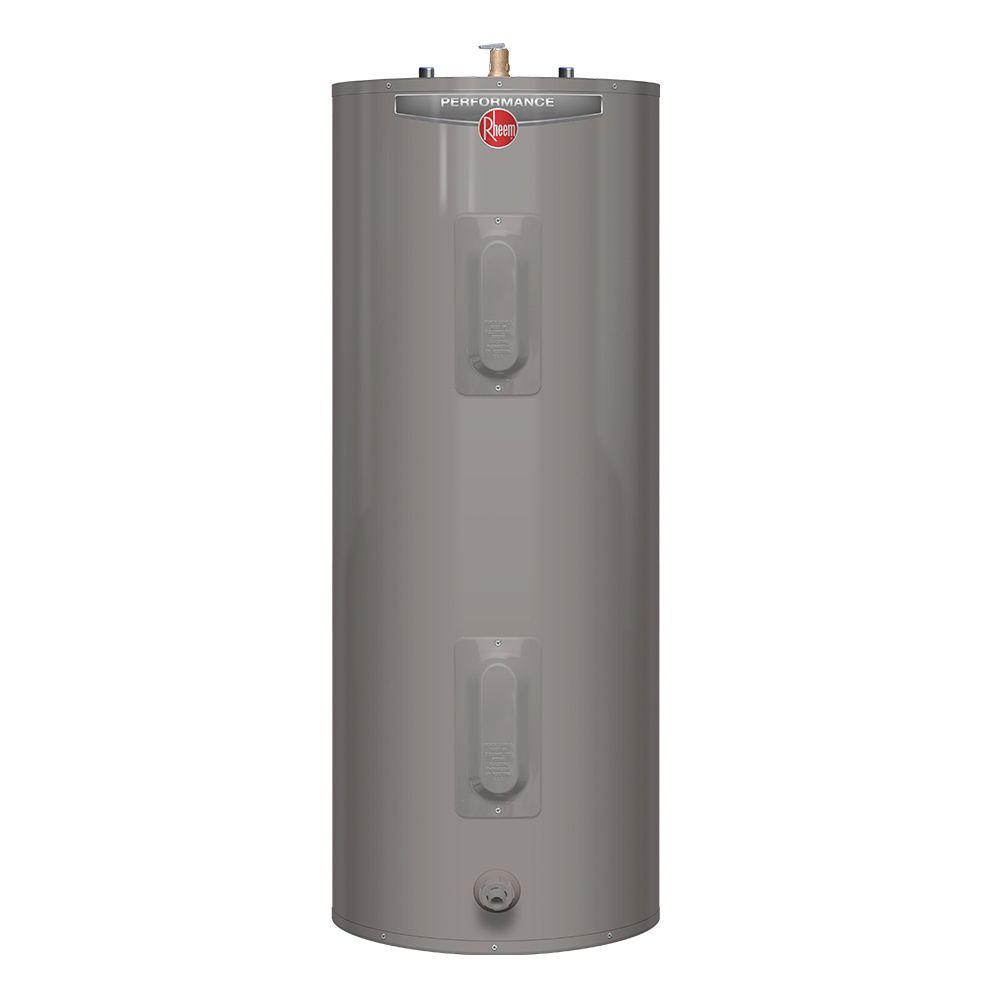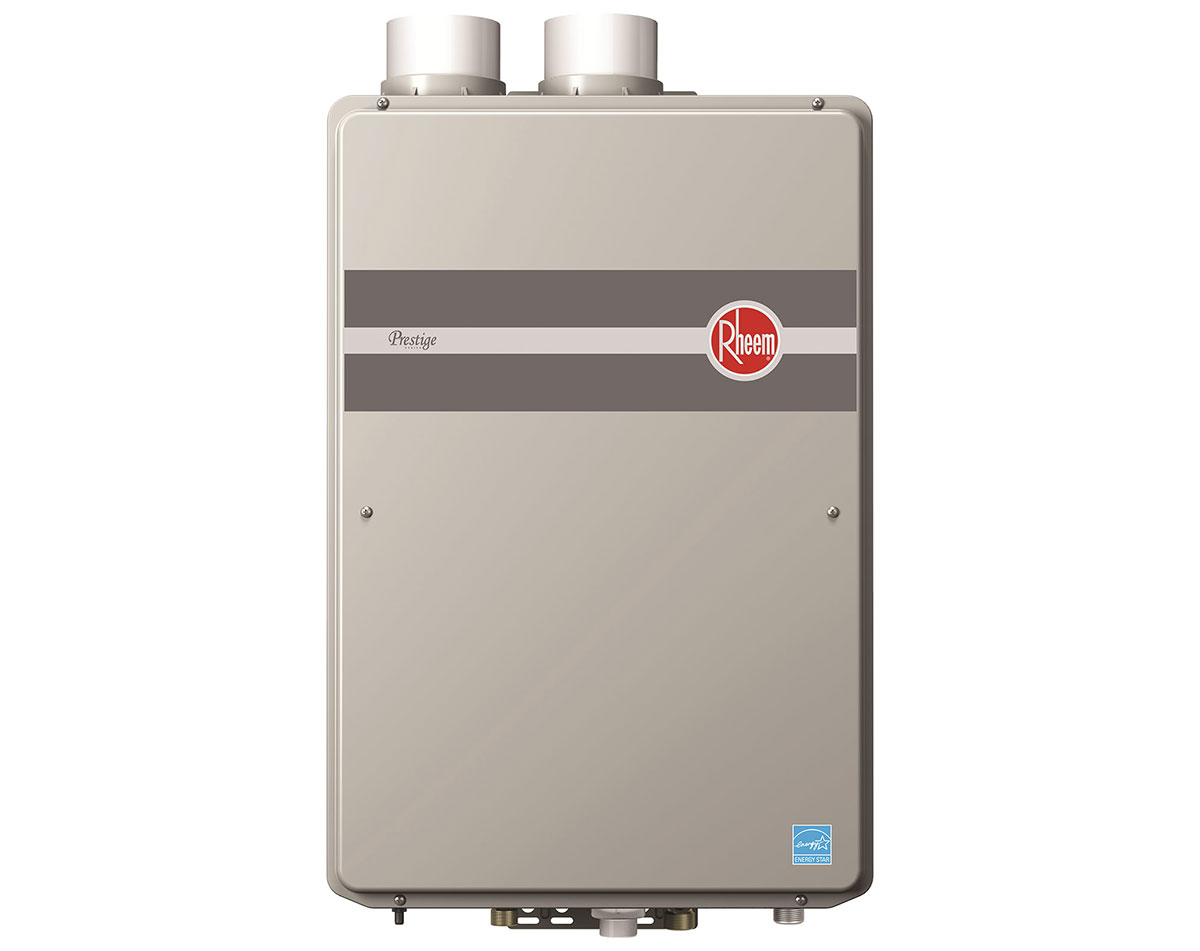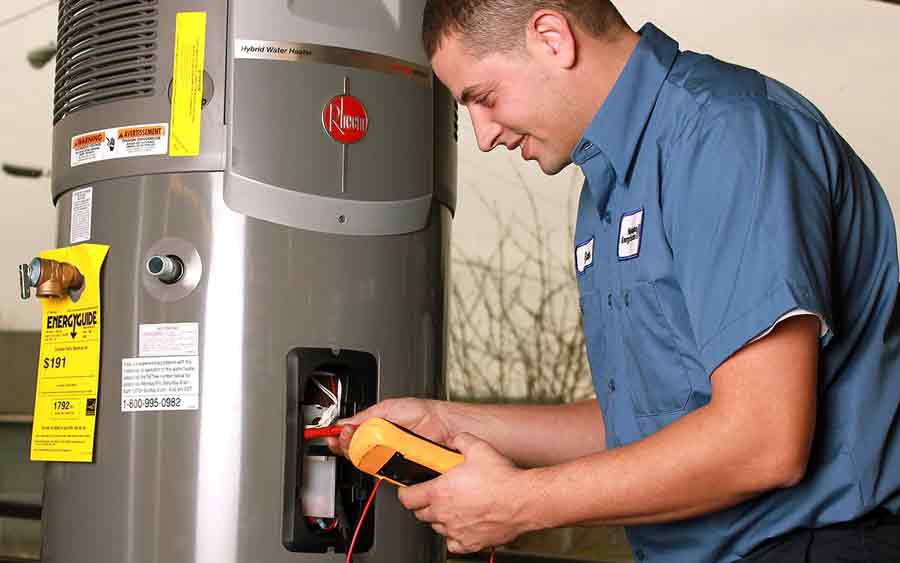
Tank vs tankless – the water heater wars
Tank water heaters
Most homes have standard 40 or 50 gallon tank water heaters. They keep water hot all day and night, ready for your use. Tank water heaters usually last around ten years, during which time even the best of them builds up sediment and a little rust. After ten years of use, don’t be surprised if a little bit of water begins to leak from the bottom signaling a failed tank and the need for a replacement. It is especially important to keep an eye on older tanks that are in the home as a leaky tank can result in water damage or worse. With this in mind it is a good idea to have a general game plan put together for when the time comes to replace your tank water heater.
The first thing you need to investigate is what type of tank you have. There are two main ways your tank heats water: electricity or gas. An electric tank has no venting and is often in a conditioned space (meaning inside your house, not the garage). There are two types of gas water heaters: B-vent and Direct Vent. B-Vent has smaller four inch venting that exhausts into a chimney or ties into another exhaust vent. The direct vent will vent directly to the exterior of the home at a 90 degree angle. Can you identify which one you have?
The electric tank is the least expensive tank to buy. However, it terms of your utility bill, an electric tank will cost you the most to run on a monthly basis. This is because it takes a fair amount of electrical power to heat the water, and electricity costs more than natural gas. We recommend that if you have the ability to get gas to the house that you get a gas water heater which will be a less overall cost to run over the lifetime of the tank.
For gas tanks there are two main efficiencies, the .67 and the .62. That means 62-67% of the fuel they take in is converted into heating. These ratings are the same for both the b-vent tanks and the direct vent tanks. The main difference is that the higher efficiency unit has a vent damper which runs about 500-800 dollars more. This will save you about $20 per month on your natural gas bill at today’s prices. In 2 years, a federal efficiency mandate will require all tanks to be at a .67 efficiency so anyone buying a tank will need this vent damper. In terms of the base cost between the direct vent and the b-vent, the direct vent is the most expensive because of the extra technology used for the exhaust venting.
Tankless water heater
The alternative for homes with gas or propane is a tankless water heater. A tankless water heater will heat water only when you need it though a heat exchanger. And it never runs out. There is no reserve of water to rust out a tank and leak. The water is pumped into the system and heated on demand. This is a great option for people who travel between homes, or don’t want to heat water when they are not there. The tankless is also a wonderful solution to problems like running out of hot water in the morning or evenings when most of your hot water usage takes place. With a tankless you can supply the unlimited hot water to more than one appliance at a time – so you can shower while your dishwasher runs and both get equally hot water.
The cost for a tankless water heater can be 2 -3 times the cost of a tank. However, they have a much longer life expectancy of 20 years, with 12 year warrany on the heat exchanger. Tankless units are more efficient, with models at 84% up to 95% efficiency (.84, .95). With that greater efficiency, if you kept your water use the same, your tankless water heater should reduce your gas bill and help bridge the price gap. However, most people find that savings short lived, as they really enjoy longer hot showers.
Having a plan in place for when your tank needs to be replaced helps reduce the stress around dealing with what is normally an unexpected problem. If your tank is 10 years or older get in the habit of checking the bottom of the tank for leaks. Once a water heater begins to leak, it can only get worse so once you spot water it is time to call us to get the problem fixed.
Related products
Suggested Reading
- 2016
- AC
- AC Installation
- AC Units
- AFUE
- air conditioing
- air conditioner
- air conditioning
- air conditioning maintenance
- air conditioning service
- air conditioning tune-up
- air duct
- air duct cleaning
- air handlers
- air pollution
- Air Purification System
- air purifier
- Air Sealing
- angie's list
- award
- basement Finishing
- Bathroom remodel
- BBB
- BBB Accredited Business
- before and after
- Best air conditioner
- best filters
- best generator
- best locks
- best water heater
- best window install
- boilers
- bryant
- Bryant AC
- bryant furnace
- bryant heat pump
- christmas lights
- clean air
- clothes drive
- Clothes For Kids
- coat drive
- combi-boiler
- comfort
- community
- Construction
- contractor
- contractors
- Cooling
- Cooling equipment
- Coronavirus Protection
- custom
- daikin
- deals
- discounts
- DIY
- Donation
- Donations
- door hardware
- door installation
- door replacement
- Door Transformations
- doors
- drafty home
- drain cleaning
- Duct Cleaning
- Duct Cleaning Services
- ductless
- Ductless heat pump
- ductless heat pump. mini-split
- Ductless heat pumps
- ductless heating system
- ductless heating systems
- ductless installation
- Ducts
- durable
- earth day
- eco friendly
- EER
- election
- electrical inspection
- emergency
- energy
- energy conservation
- energy efficiency
- energy efficiency rebates
- energy efficient AC
- energy efficient air conditioner
- energy efficient home
- energy efficient hvac
- energy efficient HVAC Systems
- energy efficient windows
- energy myths
- energy saving
- energy saving home products
- energy star
- energy tax credit
- environmentally friendly
- exterior doors
- exterior siding
- fall
- fall weather
- fiber cement
- fiber cement siding
- fiberglass doors
- filter
- filter change
- financing options
- fireplace
- fireplace insert
- fireplace repair
- fireplace tune-up
- front door
- furnace
- furnace filters
- furnace install
- furnace maintenance
- furnace mileage
- furnace problems
- furnace replacement
- furnace service
- furnaces
- Garage door replacement
- gas fireplace
- gas fireplace inserts
- Gas Fireplace Makeover
- gas furnace
- generators
- going green
- good business practices
- green solutions
- Guardian Maintenance Club
- gutters
- heat
- heat pump
- heat pump installation
- heat pump maintenance
- heat pump vs ac
- Heat Pumps
- heat pumps maintenance
- heat wave
- Heating
- Heating and Cooling equipment
- heating and cooling systems
- Heating Brands
- Heating Control
- Heating equipment
- Heating System Tuneup
- heatwave
- HEPA filter
- history
- holiday
- home
- home buyer
- home energy
- home energy efficiency
- Home energy efficiency solutions
- home exterior
- home heating
- home improvement
- Home Improvement Rebates
- home improvement repair
- home inspection
- home maintenance
- home maintenance checklist
- home maintence
- home performance
- home protection
- home repair
- home safety
- home upgrade trends
- home upgrades
- home value
- homeowners
- honeywell
- hot water
- hot water heater
- houzz
- how to
- HVAC
- HVAC Contractor
- HVAC Contractors
- hvac system
- IAQ
- indoor air quality
- infographic
- install
- install furnace
- insulated composite siding
- insulation
- intellihot
- interior doors
- james hardie
- kids
- Kitchen face lift
- LED light
- LED lights
- light bulb
- light bulbs
- locks
- mailbag
- maintenance
- march
- membership
- mini-split
- modulating furnace
- money saving
- money savings
- navien
- new door installation
- new home
- New homeowner
- new siding installation
- new windows
- news
- pacific northwest weather
- patio doors
- pets
- plank siding
- plumbing
- plumbing inspection
- pnw
- power
- power outages
- precision tune up
- preventative
- Pro Tips
- Programmable Thermostat
- Programmable Thermostats
- propane
- PSE Award
- PSE Energy
- PUD
- Q & A
- rain
- Ratings
- rebates
- refund
- REME Halo
- Remodel
- remodeling hacks
- Replacing Heating System
- reputation
- Safe Home Insulation
- sale
- save energy
- Saving money
- scam
- scams
- seamless
- seamless gutters
- seattle
- Seattle Weather
- SEER
- service
- services
- shingle siding
- Siding
- Siding replacement
- sliding glass doors
- Smart Home
- Smart thermostat
- smoke
- snow
- Solar Attic Fan
- solar power
- Solar Powered Light Strand
- sound
- spring
- standby generators
- storm doors
- summer
- summer fires
- Summer heat
- Summer home
- super service 2016
- tank water heater
- Tank water heaters
- tankless tune ups
- tankless water heater
- tankless water heaters
- tax rebate
- thanksgiving
- Thermostat
- tips
- trends
- tune-up
- upgrade
- upgrade cooling
- upgrade heating
- utilities
- utility rebates
- veterans
- Washington Energy
- washington energy services
- water conservation
- Water Heater
- water heater installation
- water heater maintenance
- water heater repair
- water heaters
- water leak protection
- Wildfire Season
- wildfire smoke
- window
- window energy efficiency
- window install
- window maintence
- window remodel
- window repair
- window replacement
- windows
- winner
- winter
- zone heating
- Air Conditioning
- Air Purifiers
- Cooling
- Doors
- Ductless heat pump
- Environmental
- Fireplace
- Furnace
- Gas fireplace
- Generators
- Heat pump
- Heating
- Home improvement
- How to
- HVAC
- Indoor Air Quality
- Insulation
- News
- Plumbing
- Rebates
- Seattle
- Siding
- Smart Home
- Tank water heaters
- Tankless water heaters
- Tips to save money
- Uncategorized
- Wildfire Season
- Windows


